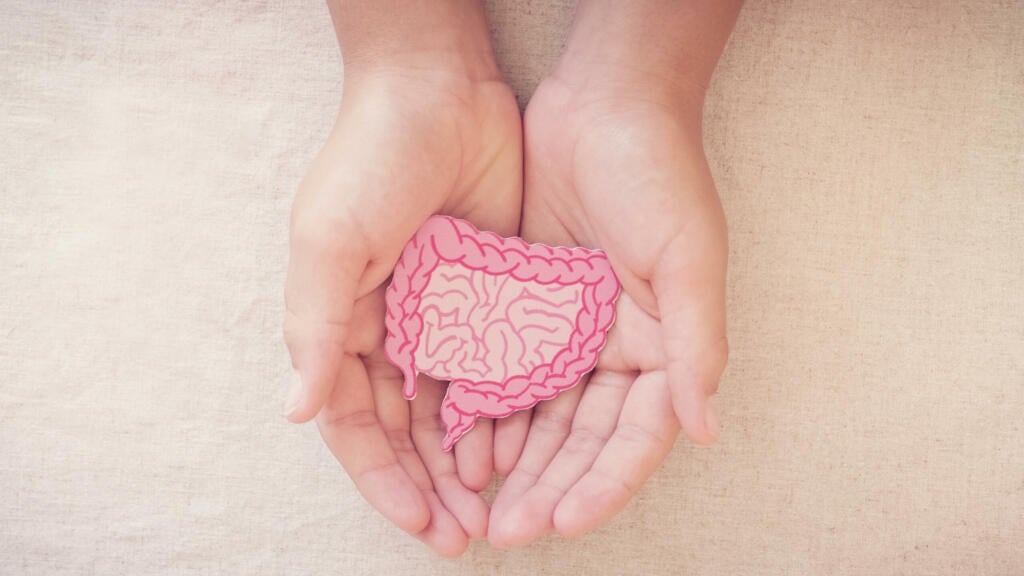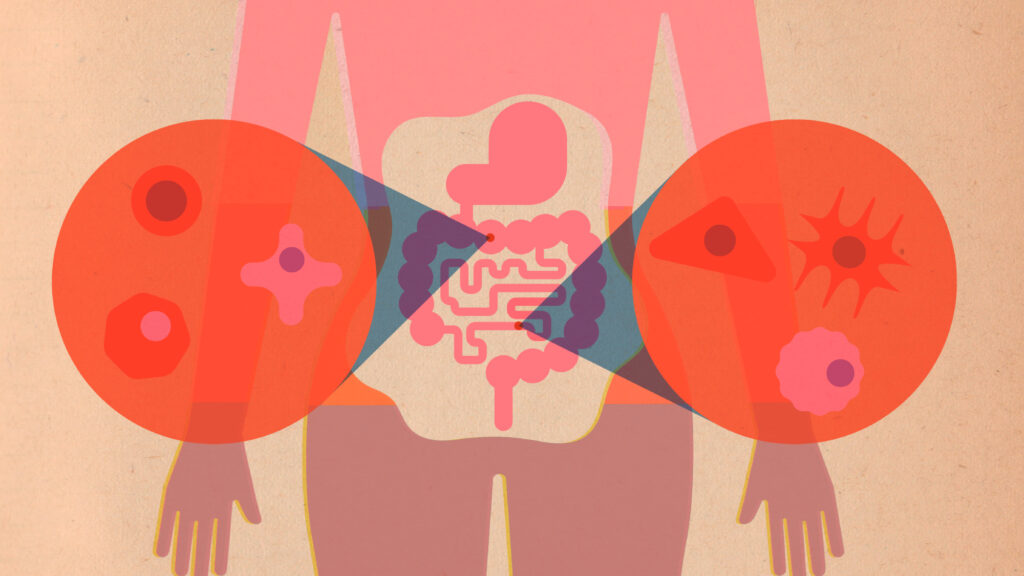
How to improve your gut health
Gemma Harris
The gut health doctor tells us about feeding your gut bacteria, drinking tea and other things you can do for a healthier gut.
Playing with Bunsen burners in the back garden of the Australian farm where she grew up, and influenced by her science-teaching mother, Megan Rossi always had a strong interest in science. Little did she know then that she would go on to achieve an award-winning PhD in gut health, publish more than 50 scientific papers in international, peer-reviewed journals, and become a best-selling author of gut health books – helping her to become known as The Gut Health Doctor.
Playing with Bunsen burners in the back garden of the Australian farm where she grew up, and influenced by her science-teaching mother, Megan Rossi always had a strong interest in science. Little did she know then that she would go on to achieve an award-winning PhD in gut health, publish more than 50 scientific papers in international, peer-reviewed journals, and become a best-selling author of gut health books – helping her to become known as The Gut Health Doctor.
 Credit: The Gut Health Doctor
Credit: The Gut Health DoctorThe impact of the gut on overall health really hit home for Rossi when working in a hospital early in her career. She was helping patients from different backgrounds with a range of conditions.
“I observed how those from elite athletes to quite sick people were all complaining of the gut in a lot of the issues that they were struggling with. That led me to do my PhD in gut health.”
It also gave her understanding that many people are fearful and confused about the gut. But she believes knowledge is key to tackling this and helping people to improve their gut health.
“I don’t want to be the person that says, you have to do this [specific thing]. I want people to be informed so then they feel empowered to make their own decision.
“If you learn to look after your gut and understand the scientific principles, then you can take control of your health.”
A lot of the knowledge Rossi has gained is through research. One of the most important things she has learnt about gut health during her career and wants to share is that “the gut affects far beyond digestive symptoms”. She adds: “Keeping it healthy and happy has been linked to a lower risk of conditions such as certain cancers, type 2 diabetes and heart disease. It also contributes to protecting your mental health and optimising your metabolism, energy, immunity and much more.”
 Credit: The Gut Health Doctor
Credit: The Gut Health DoctorRossi is keen to share her knowledge with others. She has a unique gut health tip: “Treat your gut bacteria like a pet.
“You want to look after your pet well so it lives its best and most active life possible. The same applies to your gut; you want to feed it everything that it needs to perform at its best.
“Giving ‘your pet’ different types of plant foods will allow it to flourish, meaning you can live a healthier and happier life.”
As a mum, she wants to help young people improve their gut health also. If you have grandchildren, she says to give them the same message.
By pretending they have a pet inside them, they can understand they need to feed them, she says, and also understand how this pet is helping them eat their food.
“Letting them know, for instance, that even if they don’t like their broccoli, their gut bacteria love broccoli. So if they want to be a good pet owner, they should eat a little bit of broccoli to keep their gut microbes happy.”
She adds that learning about gut health can also provide fun activities, such as making your own live yogurt or kefir.
Much of Rossi’s research has focussed gut health and ageing, including for women going through the menopause.
“The science has shown that the gut microbes can affect the health of every organ in our body, as well as our hormones. This is called the gut-hormone axis.
“Our gut bacteria help regulate oestrogen. Nurturing your gut microbiome through diet should become a priority for people going through the menopause if you want less of those frustrating symptoms, such as hot flushes and insomnia, as well as abdominal weight gain,” she explains.
If this applies to you, she says: “Opt for whole foods (foods that grow and are unprocessed, which means they are as close to their natural form as possible e.g. fresh fruit, veggies, eggs, wholegrains, or a lean cut of meat or chicken) rather than refined options.” This is because these “look after your gut bacteria, which help regulate oestrogen in your body and can reduce symptoms of perimenopause, such as hot flushes”.
Foods to help your gut and your hormones
Rossi’s recommendations for science-backed foods to help nourish the gut-hormone axis are:
Other research from Rossi has focussed on gut and bone health, and how an altered gut microbiome is linked to a lower bone mineral density in people with osteopenia (weakened bones) and osteoporosis (bones which are more severely weakened, meaning they may break). Her research has also identified that studies with a longer time frame are needed due to gut and bone health being subject to changes over a person’s lifetime.
Along with a King’s College London team, Rossi is currently looking at how additives in food may affect gut health.
 Credit: Shutterstock/FOTOGRIN
Credit: Shutterstock/FOTOGRIN1. Eat something from each of the super-six plant foods each day. She says each category of plants provides bacteria with different nutrients, which nourish them and can support hormonal regulation. “Getting more of these plants in can help strengthen bone health as well,” Rossi adds. The super-six plant foods are:
2. Speaking on This Morning, Rossi recommended drinking two to three cups of tea per day. “Tea is a really good source of polyphenols (natural antioxidant compounds found in plants) which feed the good [gut] bacteria,” she said. However, she warns against having too much caffeine. If you want to drink tea throughout the day, she suggests switching to decaf or herbal teas after lunchtime to avoid interfering with your sleep.
3. Make sure you’re getting the levels of fibre you need – “Fibre is an amazingly powerful nutrient. It feeds our gut bacteria, which is so important for not just our digestive health, but the health of just about every other organ in our body. For maximum health benefits, opt for meals and snacks that pair fibre with either a protein or a healthy fat. This has the added benefit of supporting your blood sugar balance while also keeping your appetite hormones in check, keeping you more satisfied for longer.”
4. Aim to eat 30 different plant-based foods per week – Tested by Rossi and her team at her Gut Health Clinic, eating at least 30 different plant-based foods a week has been proven to result in greater diversity of gut microbes than if you eat fewer, even if you eat more plants in total. More diverse gut bacteria is linked to better gut health.
5. Support your immune system – 70% of the body’s immune cells live within our gut. “And vitamins A, C, D, and E, as well as selenium and zinc, have a role in supporting the immune system,” says Rossi. “If you’re getting a good range of plants within your diet (aiming for the 30 per week will help) you’ll be getting a good amount of these nutrients and you don’t need to spend money on supplements.” Foods filled with key nutrients and phytochemicals that Rossi says will help boost your gut health and your immune system include:
6. Make it work for you – “If it is becoming more challenging to include a good range of tough, fibrous plant-based products as you age, consider ground or milled versions of nuts and seeds, or additional veg and fruits in smoothies and juices.”
7. Spend time outdoors and do movement you enjoy – Rossi says: “This will help maintain a good community of bugs within your lower gut.”
Rossi is as passionate about making gut health accessible to everyone as she is the topic itself. She believes having access to good nutrition is a basic human right to help people feel their best.
“Nutrition is really powerful for people’s health,” she says. “If people can’t nourish their bodies properly, they will have more sick days; they will have poorer mental health; they’re not going to live as long. It’s so unfair to put people in those positions.”
Rossi has noticed how the cost-of-living crisis has made access to good nutrition even more difficult, meaning equity is further from reach. She’s seen first-hand through the work of her husband, an NHS GP, that patients are struggling to feed themselves and their families.
“This highlights nutrition quality will be even poorer, because people don’t necessarily have access at food banks to fresh foods.” She says that this is an issue that needs addressing and to be made a priority.
Focussing on the cost of prevention rather than the cost of treatment is also key to making this happen and something Rossi believes the government should be investing in.
 Credit: The Gut Health Doctor
Credit: The Gut Health DoctorIt was a bereavement during her final year of studying dietetics that sparked Rossi’s interest in gut health, when her beloved grandmother died from bowel cancer. This spurred a realisation of the impact of nutrition and the gut microbiome on health, and led Rossi to develop a lifelong commitment to the gut. She moved to the UK and became a Research Fellow at King’s College London, publishing Eat Yourself Healthy in 2019 and The Sunday Times bestseller Eat More Live Well in 2021.
Following her passion for gut health, sharing this knowledge and striving for these changes hasn’t always been easy. Taking maternity leave to have her son is something she found to be a struggle.
“I took four weeks of maternity leave when I had my son because working on scientific papers and having businesses means you can’t completely leave them. I didn’t come back full time and did just a few hours every day, but you can’t completely switch off.”
Having a supportive husband and a trustworthy team of colleagues around her really helped Rossi to gradually transition back to work and make sure it was something she was happy and ready to do.
Being a researcher and raising a family is a constant balancing act for Rossi. Her strong passion for her research makes it difficult for her to switch off.
“I have to say to myself that I need to completely down tools and just focus on family time. Having boundaries in place is probably how I’ve learned to juggle the two.”
On top of this, Rossi also had to keep in mind her child’s gut health. Managing all of the above simultaneously could lead to stress, and evidence shows stress is not good for the digestive system.
So Rossi has a secret for keeping her gut calm. “I keep on top of nutrition and do five or 10 minutes of mindfulness each evening to help prioritise my gut health and relax the gut-brain axis (a two-way communication system between the gut and the brain).”
Whether she’s producing her next research paper, tucking her son into bed or taking a well-earned five minutes, Rossi’s dedication to gut health continues. She leads The Gut Health Clinic alongside other gut-specialist registered dietitians and uses the latest science to achieve her mission to “transform everyone’s gut health”.
As well as running The Gut Health Clinic, which has a lot of handy information about gut health on its website, Rossi is the co-founder of gut health food brand Bio&Me.

Written by Gemma Harris she/her
Published: Updated:
Gemma Harris has been a journalist for over seven years and is a self-confessed health and wellbeing enthusiast, which led her to specialise in health journalism. During her career, she has worked with top editors in the industry and taken on multiple high-discipline fitness challenges for certain outlets. She is particularly passionate about nutrition; after being diagnosed with irritable bowel syndrome in 2016, she discovered her fascination for gut health and founded thegutchoice.com – a dedicated space for providing a hopeful outcome for people with gut issues. Gemma’s core aim is to help others through her writing.

Gemma Harris

Gemma Harris

Gemma Harris

Ruth Tierney

Patsy Westcott